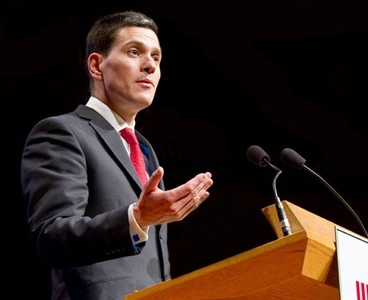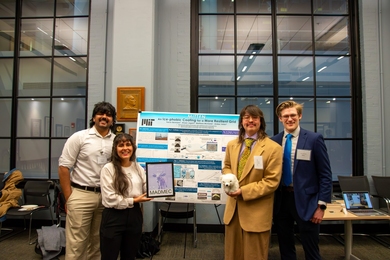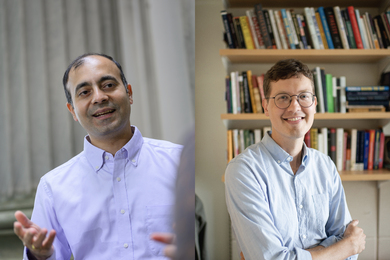While riots and political upheaval in Libya have dominated international headlines recently, David Miliband, a member of the British Parliament and former foreign secretary for the United Kingdom, says Afghanistan “musn’t become the forgotten war, despite the importance of the events in the Middle East and North Africa.” Miliband, an alumnus of MIT's Department of Political Science, will also be giving a Starr Forum talk today at the MIT Center for International Studies titled “Afghanistan: Mending It, Not Just Ending It.” MIT News talked with Miliband about the need for a revamped political strategy for Afghanistan, where there has been increasing violence in recent months.
Q. General David Petraeus — the U.S. commander in Afghanistan — and others have said there has been success in confronting the Taliban in Kandahar province. But recently, there has been increased violence there, such as riots this month in response to the Florida Koran burnings. Are the operations in Kandahar indeed a success?
A. I think it’s very important to distinguish tactical success from strategic effect. What I’ll be arguing in my lecture is that there’s a disconnect between the extraordinary bravery and intelligence and skill with which military and diplomatic maneuvers are being conducted, and the overall strategic issue of how Afghanistan is able to become a country again that is able to govern itself in a way that protects its own citizens and also protects the international community. Without a political framework, the military and development effort is massively hampered. And that political framework needs to be one that works with the grain of Afghan society. It’s a very decentralized society, in which tribal structures remain quite strong despite 30 years of civil war. And my argument is without a political framework — which means the internal organization of Afghan politics, but also the engagement of the neighboring countries — the military and development effort is going to be really struggling.
Q. Last year when you spoke at MIT about the situation in Afghanistan, you suggested a peaceful resolution might involve giving more political control to groups currently supporting the Taliban. What is your view on that now?
A. Well, I think that General Petraeus himself has said that 80 percent of those who are fighting in the Taliban insurgency are not idealogues committed to al-Qaida. And my argument would be that all those who are willing to live within the norms established by the Afghan constitution, be inside the political framework.
In the end, the mission is to prevent Afghanistan from hosting al-Qaida. The mission and the driving of the Taliban from power was an essential part of that. But I think if you look at the detailed work, it’s quite evident that we’ve missed quite a lot of tricks both internally and in terms of the way the neighboring states could be engaged. My own view is that simply more military effort isn’t going to be sufficient, and we’ve got to stop paying lip service to the idea that there isn’t a military solution, and actually put the flesh on the bones of a political drive.
Q. Afghan President Hamid Karzai has set 2014 as the year when Afghans may take over leadership of all military and police enforcement operations. In your view, is it realistic to think that U.S. and other international troops will be able to pull out by then?
A. Well, I think that an end date without an end game is not a strategy. And it’s very important to pay proper recognition to the efforts being made to train up Afghan security forces. Large numbers are now in the Afghan security forces, but the attrition rate is massive, and the sense of concern, especially in the south and east in the ethnic makeup of the Afghan security forces, is real.
I think at the moment, the difficulty is that although the insurgency can be suppressed in a district by a combination of international and Afghan troops, it appears elsewhere. So there’s more insecurity now than there was last year. The international community of the Red Cross says there’s more violence now than in the last 30 years. Now, we’ve got to be very careful to ensure that the military effort is part of a coherent and comprehensive plan. And that’s something that can’t be left to generals alone. It requires politicians to step up.
Q. How can the U.S., Great Britain and other countries try to limit corruption and other problems that have often been publicized concerning Afghanistan’s government?
A. We’ve obviously got to try to be transparent in our own dealings, we’ve got to be vigilant. But we will not end corruption in Afghanistan by our efforts. This is a country that’s both very poor and potentially very rich, which is a very dangerous combination. Rich in minerals and rich in drugs. And it has been the economic crossroads of South Asia historically. Bribery has been estimated to be 25 percent of GDP in Afghanistan. So we shouldn’t kid ourselves that we will be able to sort this problem out. Equally, we’ve got to make sure we don’t make it worse, and if possible, make it better. And so that’s why I think it’s important to have a strategy to end the war.
Q. General David Petraeus — the U.S. commander in Afghanistan — and others have said there has been success in confronting the Taliban in Kandahar province. But recently, there has been increased violence there, such as riots this month in response to the Florida Koran burnings. Are the operations in Kandahar indeed a success?
A. I think it’s very important to distinguish tactical success from strategic effect. What I’ll be arguing in my lecture is that there’s a disconnect between the extraordinary bravery and intelligence and skill with which military and diplomatic maneuvers are being conducted, and the overall strategic issue of how Afghanistan is able to become a country again that is able to govern itself in a way that protects its own citizens and also protects the international community. Without a political framework, the military and development effort is massively hampered. And that political framework needs to be one that works with the grain of Afghan society. It’s a very decentralized society, in which tribal structures remain quite strong despite 30 years of civil war. And my argument is without a political framework — which means the internal organization of Afghan politics, but also the engagement of the neighboring countries — the military and development effort is going to be really struggling.
Q. Last year when you spoke at MIT about the situation in Afghanistan, you suggested a peaceful resolution might involve giving more political control to groups currently supporting the Taliban. What is your view on that now?
A. Well, I think that General Petraeus himself has said that 80 percent of those who are fighting in the Taliban insurgency are not idealogues committed to al-Qaida. And my argument would be that all those who are willing to live within the norms established by the Afghan constitution, be inside the political framework.
In the end, the mission is to prevent Afghanistan from hosting al-Qaida. The mission and the driving of the Taliban from power was an essential part of that. But I think if you look at the detailed work, it’s quite evident that we’ve missed quite a lot of tricks both internally and in terms of the way the neighboring states could be engaged. My own view is that simply more military effort isn’t going to be sufficient, and we’ve got to stop paying lip service to the idea that there isn’t a military solution, and actually put the flesh on the bones of a political drive.
Q. Afghan President Hamid Karzai has set 2014 as the year when Afghans may take over leadership of all military and police enforcement operations. In your view, is it realistic to think that U.S. and other international troops will be able to pull out by then?
A. Well, I think that an end date without an end game is not a strategy. And it’s very important to pay proper recognition to the efforts being made to train up Afghan security forces. Large numbers are now in the Afghan security forces, but the attrition rate is massive, and the sense of concern, especially in the south and east in the ethnic makeup of the Afghan security forces, is real.
I think at the moment, the difficulty is that although the insurgency can be suppressed in a district by a combination of international and Afghan troops, it appears elsewhere. So there’s more insecurity now than there was last year. The international community of the Red Cross says there’s more violence now than in the last 30 years. Now, we’ve got to be very careful to ensure that the military effort is part of a coherent and comprehensive plan. And that’s something that can’t be left to generals alone. It requires politicians to step up.
Q. How can the U.S., Great Britain and other countries try to limit corruption and other problems that have often been publicized concerning Afghanistan’s government?
A. We’ve obviously got to try to be transparent in our own dealings, we’ve got to be vigilant. But we will not end corruption in Afghanistan by our efforts. This is a country that’s both very poor and potentially very rich, which is a very dangerous combination. Rich in minerals and rich in drugs. And it has been the economic crossroads of South Asia historically. Bribery has been estimated to be 25 percent of GDP in Afghanistan. So we shouldn’t kid ourselves that we will be able to sort this problem out. Equally, we’ve got to make sure we don’t make it worse, and if possible, make it better. And so that’s why I think it’s important to have a strategy to end the war.






